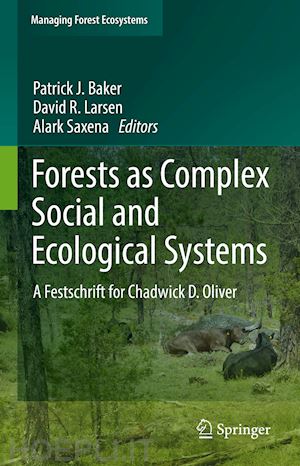
Questo prodotto usufruisce delle SPEDIZIONI GRATIS
selezionando l'opzione Corriere Veloce in fase di ordine.
Pagabile anche con Carta della cultura giovani e del merito, 18App Bonus Cultura e Carta del Docente
Professor Chadwick Dearing Oliver has made major intellectual contributions to forest science and natural resources management. Over the course of his career he has actively sought to bring research and practice together through synthesis, outreach, and capacity-building. A common thread throughout his career has been complexity and how we as a society understand and manage complex systems. His work on forest stand dynamics, landscape management, and sustainability have all focused on the emergent properties of complex ecological and/or social systems. This volume celebrates a remarkable career through a diverse group of former students and colleagues who work on a wide range of subject areas related to the management of complex natural resource systems.
Over the past decade there has been considerable discussion about forests as complex adaptive systems. Advances in remote sensing, social methods, and data collection and processing have enabled more detailed characterisations of complex natural systems across spatial and temporal scales than ever before. Making sense of these data, however, requires conceptual frameworks that are robust to the complexity of the systems and their inherent dynamics, particularly in the context of global change.
This volume presents a collection of cutting-edge research on natural ecosystems and their dynamics through the lens of complex adaptive systems. It includes contributions by a wide range of authors from academia, NGOs, forest industry, and governmental organisations with diverse perspectives on forests and natural resources management. Each chapter offers new insights into how these systems can be made more resilient to ensure that they provide a diversity of ecological and social values well into the future. Together they provide a robust way of thinking about the many challenges that natural ecosystems face and how we as society may best address them.
Introduction.- 1. Chad Oliver and forests as complex systems; Melih Boydak.- Section I. Complex Forest Stand Dynamics.- 2. Principles of stand reconstruction to illuminate stand dynamics of complex forests in Alaska; Bob Deal.- 3: Forest stand dynamics principles used to guide the management of uneven-aged forest in the Missouri Ozarks; Dave Larsen.- 4: Forest stand dynamics and the curious case of the critically endangered Leadbeater’s Possum; Patrick Baker.- 5: Modelling and mapping complex stand structures with airborne LiDAR; John Kershaw.- 6. How might the concepts of traditional stand dynamics be used for more complex stands; Bruce Larson.- Section II. Forests as Complex Ecological Systems.- 7. Integrating effects of climate on temperate montane forests; Pil Sun Park.- 8. Carbon++: integrating non-CO2 forcers in our understanding of forests and climate; Kris Covey.- 9. Understanding post-wildfire fuel dynamicsin dry forests of the Pacific Northwest; Morris Johnson.- 10. Understanding forestry through pictures: A journey of graphics, pictures, and visualisations; Jim McCarter.- 11. The inertia of forested landscapes and applications to management; Jeremy Wilson.- Section III. Forests as Complex Social Systems.- 12. Tiger in the woods, elephant in the room; Xuemei Han.- 13. Forests as complex systems: Implications from the perspective of sustainable development; Glenn Galloway.- 14. Securing forest tenure for rural development; Gerardo Segura.- 15. Understanding the dynamics between forests and livelihoods: A case of Central Indian landscapes; Alark Saxena.- 16. Closing comments; Chad Oliver.











Il sito utilizza cookie ed altri strumenti di tracciamento che raccolgono informazioni dal dispositivo dell’utente. Oltre ai cookie tecnici ed analitici aggregati, strettamente necessari per il funzionamento di questo sito web, previo consenso dell’utente possono essere installati cookie di profilazione e marketing e cookie dei social media. Cliccando su “Accetto tutti i cookie” saranno attivate tutte le categorie di cookie. Per accettare solo deterninate categorie di cookie, cliccare invece su “Impostazioni cookie”. Chiudendo il banner o continuando a navigare saranno installati solo cookie tecnici. Per maggiori dettagli, consultare la Cookie Policy.